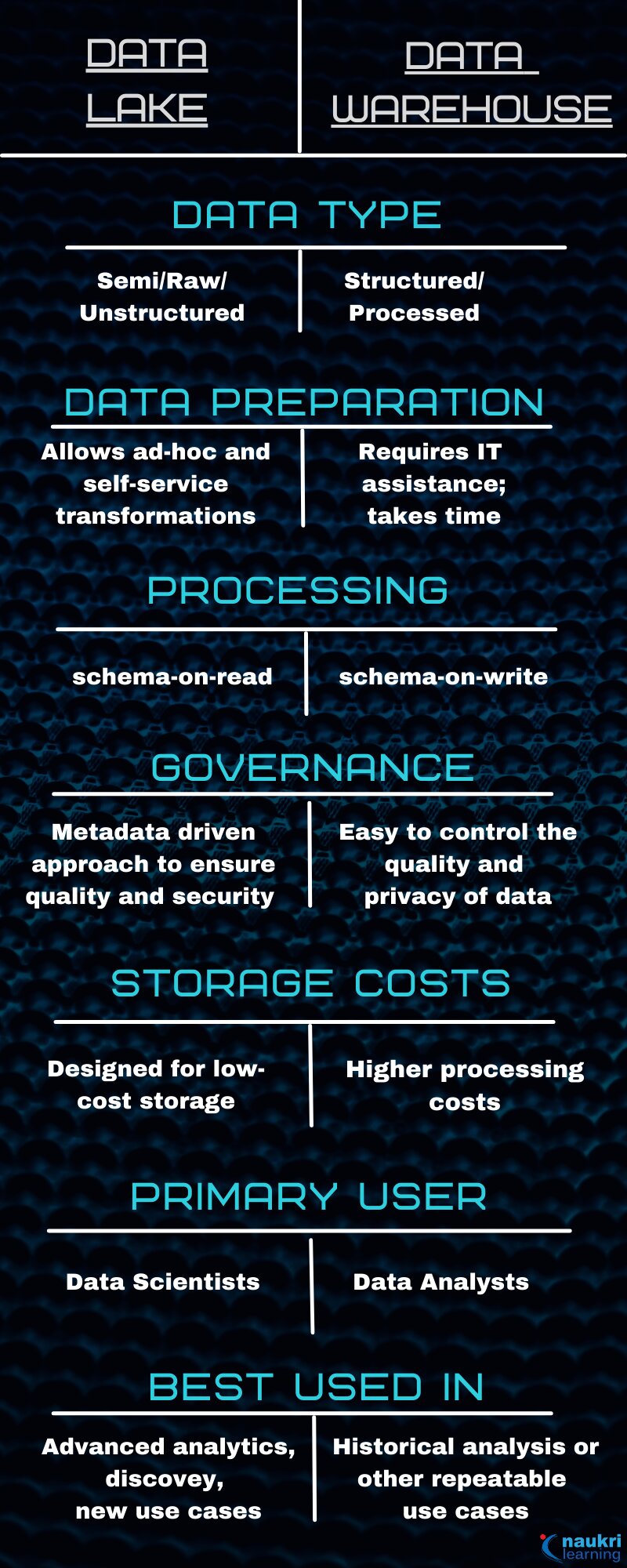Data Lake vs Data Warehouse – Concepts Explained
The humongous volumes of data generated every second demand efficient storage solutions. Data storage has become a topic of discussion among businesses depending on data since it is no longer a simple issue for data managers and data scientists to deal with. When it comes to managing and storing data, data lakes and data warehouses have gained a lot of popularity in recent years. The article tries to explore the concepts of data lakes and data warehouses and covers data lake vs data warehouse.
Understanding Data Lakes and Data Warehouses
Data Lakes
A data lake is a storage repository, which can hold huge amounts of raw data. This data is kept in these repositories for as long as necessary, under a flat architecture. It is mainly used in –
- Data discovery and exploration
- Simple ad hoc analysis
- Complex data analysis for decision making
- Reports
- Real-time analysis
Advantages of Using Data Lakes
- No need to discard data
- Can nurture multiple users in a company
- Easily adapts to changes
- By being able to integrate different types of data, all kinds of analysis can be carried out
- Easily adds new data
You May Also Like – Types of Data Every Aspiring Data Scientist Must Know About
Data Warehouse
A data warehouse is a data storage system designed to support the flow of data from operating systems to decision systems. It collects data from various sources, internal or external, and organizes it in a very specific way to optimize its recovery for commercial purposes. Unlike a data lake, a data warehouse is a deliberate source of structured data. Furthermore, it is a single repository of multiple sources, many of which are data lakes themselves.
Must Read – Data Warehouse Architecture – Basic Concepts
Advantages of Using Data Warehouses
- Faster access to information
- Increases productivity
- Offers results in real-time.
- If the data sources and the objects are defined, its implementation in the company is very simple
- Transforms data into knowledge
- Useful for medium and long terms
- Facilitates data-driven decision making
- Reduces response times and operating costs
- Suitable for generating reports
Best-suited Data Management courses for you
Learn Data Management with these high-rated online courses
Data Lake vs Data Warehouse
Understand the basics of Data Lake vs Data Warehouse in the below infographic.
Data Type
While Data Lake relies on collecting raw data that may or may not be structured, Data Warehouse only collects structured data.
Purpose of the data
Data Warehouses are generally made up of data extracted from transactional systems and data sources like UGC, web server logs, social media data, etc. New uses continue to be found for these types of data, but consuming and storing them can be expensive and difficult.
Data Lakes stream data from various sources. These are non-traditional data types and data lakes store them irrespective of their source and structure. Usually, they are stored in their original or raw form and are only transformed when required. This approach is known as “Schema on Read” compared to “Schema on Write” which is the approach used in the Data Warehouse.
You May Like – Data Transformation in Data Mining – The Basics
Flexibility
As there is no structure in a Data Lake, it is easier to make changes since it is much more flexible and we can change its configuration, as we need. However, in Data Warehouse systems it is more complex and can take much more time by involving numerous related business processes.
Users
In Data Lake the data falls into the hands of Data Scientists who structure the information and prepare their analyzes, after all, they are data scientists. However, in Data Warehouse, data analysts and business users, who report and extract its meaning from the information that was defined when configuring it, manage the information.
Accessibility
While in Data Lake, there is great accessibility and easy access in Data Warehouse it is expensive and complex.
Storage
In Data Lake it has a limited cost and can be expanded in the cloud while in Data Warehouse it is much more expensive.
Security
Data Lakes are systems that are more vulnerable to security and that sometimes raises certain doubts when choosing them as repositories of information.
Also Read – Top Data Warehouse Interview Questions and Answers
Conclusion
Data Lake is being increasingly used to handle big data, which are massive and take a long time to process to obtain meaningful insights. Having a scalable and centralized solution for storing massive amounts of raw data that enables native integration with powerful data analytics and business intelligence tools is becoming an increasingly essential set of tools for companies that want to be more data-driven in their decision-making. The “data lake vs data warehouse” conversation is bound to happen when it comes to choosing the right data storage solutions. We would like to emphasize that both solutions are unique and companies should take into consideration facts like usage, costs, ease of processing, etc. remember, having the right solution can be instrumental in the overall growth of your business.
If you have recently completed a professional course/certification, click here to submit a review.

Rashmi is a postgraduate in Biotechnology with a flair for research-oriented work and has an experience of over 13 years in content creation and social media handling. She has a diversified writing portfolio and aim... Read Full Bio



